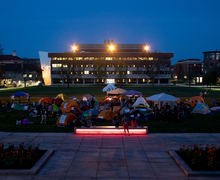University Lectures : Sedaris uses memories to humor crowd
Students, faculty, staff and community members wait outside the Schine Student Center on Tuesday before being allowed to enter Goldstein Auditorium and hear David Sedaris speak.
David Sedaris’ father kept a metal serving spoon next to his plate on the dinner table when Sedaris was growing up. During meals, he used it to whack Sedaris over the knuckles or on the head.
‘I would not have traded my father for anyone,’ Sedaris told the crowd in Goldstein Auditorium in the Schine Student Center at 6 p.m. Tuesday, saying that his father’s constant disapproval still motivates him to prove he could succeed at something.
Approximately 1,400 people attended the event, said Esther Gray, senior administrator for academic affairs, in an email after the event.
‘That is so painful,’ he said, referring to being thumped with the oversized spoon. ‘But I had to laugh. It was that over the top.’
Sedaris’ family provides much of the material in his best-selling memoirs. During the lecture, he read pieces about trying to win his father’s approval at his childhood swim meets. He also joked about parents today, who he said are much more lenient than parents were 40 years ago.
Sedaris recounted his lack of athleticism as a childhood swimmer. His father was far prouder of singer Donny Osmond, Sedaris’ swim team’s best competitor who is two years younger than Sedaris and now owns a group of stores selling sex toys in North Carolina.
He said his mother consoled him by asking: ‘Who wants to be the best at something you do in a bathing suit?’
Sedaris also said he sees parents today coddling and praising their kids, including ‘volcanic three-year-olds’ who scream at their parents in grocery stores. When he was young, he said, parents didn’t just hit their own kids for acting out. They also hit other people’s kids. And nobody blinked because of it.
Sedaris read from a piece called ‘I’m not running for president,’ in which he poked fun at Republican and Tea Party candidates running for president. In the piece, God told Sedaris he was better qualified than the rest of the pack in the presidential race, he said.
Sedaris’ pieces appear regularly in The New Yorker. He saw his career take off after his series about working as an elf at Macy’s department store in New York City, ‘The Santaland Diaries,’ aired on NPR.
Sedaris, who is openly gay, read a story from his diary that included a quiz for mothers to tell if their sons are gay. The questions did not make him feel sorry for gay teenagers, he said, but for straight ones.
‘Does he wear sweatpants to Christmas dinner?’ Sedaris asked. ‘Congrats! He’s a heterosexual.’
Sedaris appeared small behind the university’s podium. Soft-spoken with bright blue eyes, he dispensed advice to students and aspiring writers.
‘You are so young to feel discouraged. This is your time to suck,’ he said, adding that it’s almost unheard of for writers to get published in their early 20s.
George Saunders, a professor at Syracuse University and a regular contributor to GQ Magazine and The New Yorker, said Sedaris has a knack for staying alert to what’s funny. Sedaris does this both when it happens and when he goes to write about it later, Saunders said. Humor comes to Sedaris effortlessly, he said.
Saunders recalled a trip he and Sedaris took to Capri, Italy, to attend a writers’ conference. From inside a bus, Sedaris had a group of three grade-school-aged Italian girls on the side of the street laughing uncontrollably. Sedaris was miming his plan to steal away the lollipops they had been eating.
‘I don’t think he has to try,’ Saunders said. In Sedaris’ writing, ‘the project is not to get laughs but also to get heart. There’s not a lot of writers who do that.’
Katie Giarrusso, an Onondaga Community College student who plans to transfer to SU in the fall, said she has read all but one of Sedaris’ books three times over. She brought worn paperback copies of Sedaris’ books ‘Naked’ and ‘Dress Your Family in Corduroy and Denim’ with her for Sedaris to sign — their pages falling off the spine from use.
Giarrusso said she wouldn’t mind standing in line late into the night for Sedaris to sign her books.
‘I’m gonna wait as long as it takes,’ she said.
Sedaris signed one of his books for Paul Czuprynski, a senior English education major.
‘I wish you were my English teacher,’ Sedaris wrote.
Czuprynski started reading Sedaris’ books three months ago. Since then, he said he’s finished almost all of them. He said he plans on doing a David Sedaris unit in the creative writing course he teaches as a student teacher.
Czuprynski said his favorite part about Sedaris’ writing is that he draws humor from everyday, real-life situations.
‘You don’t have to be experienced to have an experience or story to share,’ Czuprynski said.
Sedaris said his father went to SU. The writer also wanted to apply to the university’s writing program, but was too intimidated by its prestige to apply, he said.
Now that Sedaris is famous, he said, his father doesn’t resent the picture his son paints of him in his memoirs. But he’s not satisfied with Sedaris, either. Instead, he nags Sedaris to get his prostate checked out by a doctor, he said.
‘I want a light at the end of the tunnel,’ Sedaris said, ‘but not that tunnel.’
Published on October 11, 2011 at 12:00 pm




